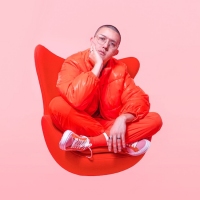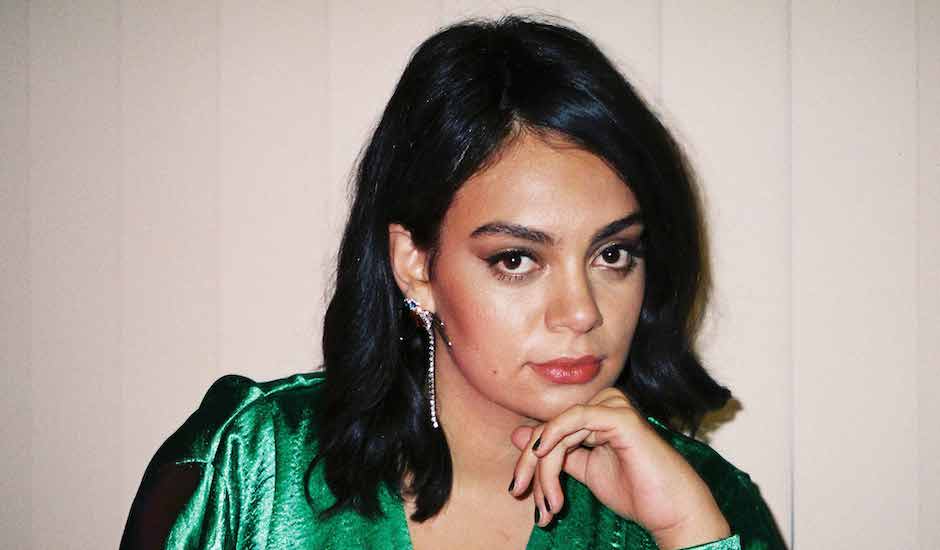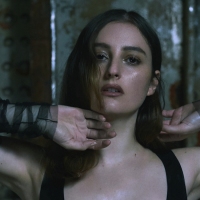 Greatness, Goldlink & Good Lords: Inside Billy Davis' HeadspaceWhen he's not working with some of rap's biggest names, Billy Davis is positioning himself as one of Melbourne's essentials.
Greatness, Goldlink & Good Lords: Inside Billy Davis' HeadspaceWhen he's not working with some of rap's biggest names, Billy Davis is positioning himself as one of Melbourne's essentials.

Love & War: How Thelma Plum found therapy in Better In Blak
After endless social media hate and racism, Better In Blak is a triumphant middle finger from one of Australia's best.
Thelma Plum isn’t holding anything back on her debut album Better In Blak.
Five years ago, the Gamilaraay artist was singing songs about the trials and tribulations of love, supercut with bits and pieces of everything you would expect from a fresh 18-year-old, navigating the world. However, this was never in a frivolous way - Plum’s understanding of the world has always been a little more considered – but there’s still a stark difference from her Rosie (2013) and Monster (2014) EPs to the matured, deeply considered cultural takes that pepper her latest release. There are still little romantic quirks (namely the infamous “I went on your Facebook to see if you’re single and accidentally liked something from 400 weeks ago” of Nick Cave), but the standout moments on the album come from matter that stretches far beyond the universal love song.
Five years is enough time passing for most people to change, without even considering the added pressures of being thrust into the public eye. Incidentally, following a string of very heated public altercations in 2016, Thelma Plum quickly and unintentionally became the spokesperson for people of colour in Australia’s music industry – where she has since fought tirelessly against non-diverse festival line-ups and the injustices of Indigenous peoples in all facets of life. She also, simultaneously, copped the brunt of online trolls (see track: Woke Blokes, if you will) who embody Australia’s inherent and blatant racism. It shouldn’t be her job - nor the job of other people of colour - to make this noise (which she explains a little further down in this piece), yet she does it very matter-of-factly, and with grace. Naturally, this activism and passion can be found scattered all throughout Better In Blak, because to her, it’s not activism. It’s her life. It’s the discrimination and hate she faces regularly, as a young, empowered blak woman.
To say Better In Blak is a reclamation of Plum’s identity would be dismissive of a whole lifetime spent as a proud Gamilaraay woman, living in the face of adversity. Instead, this is a public declaration of “self-care and self-love,” a body of work that explores Plum nurturing and expressing both herself and her identity. There’s Homecoming Queen, a song that details how Plum felt growing up, seeing no one like her represented in the media; the title track Better In Blak, which takes black erasure in the music industry, and throws it back in their faces; and the aforementioned Woke Blokes, which speaks for itself in the line “he says, ‘change the date? You should be grateful; you’re only stirring the pot. Babe, there’s only so much I can do, and the whinging’s gotta stop.’” Each song has an underlying sense of accomplishment and self-assurance, without ever feeling like an exploitation of Plum’s culture and identity, because sitting beside all these things is a genuine vulnerability.
Although Thelma Plum as an Aboriginal woman is the focal point of Better In Blak, the album spans across multiple sides of her. Made For You (which features guitar lines written by Paul McCartney, whilst recording in the same London studio as Plum) shows the artist as a lover, Thulumaay Gii touches on family tension, and Ugly claps back at someone who really just seems like an attractive jerk. There’s also, of course, Love and War - a richly poignant song where Plum joins forces with dear friend Dave Le'aupepe of Gang Of Youths, in what’s sure to be one of the most powerful collaborations of 2019. The many faces of Thelma work together in harmony, almost as an act of defiance towards anyone who wrongly assumed that she was only one thing or another.
All this commentary is only one part of the picture though, with Plum and producer Alex Burnett (of Sparkadia, Antony & Cleopatra) developing a huge sonic palette to lay as the album’s foundation. Better In Blak may kick off with the melodic pop gem Clumsy Love, but over the course of 40-ish minutes, that moves into the minimalist, artsy Don’t Let A Good Girl Down, through to the tender, acoustic confessional Do You Ever Get So Sad You Can’t Breathe. Plum slips between genres with ease, weaving stories that build on exactly who she is, right now. There’s something for everyone to relate to in this album because, despite the many narratives, Better In Blak has all the hallmark signs of a young artist so deeply aware of themselves across every aspect of life.

Better In Blak surprised me! Your singles have been complete bops (for lack of a better word) but then listening to the album, it’s clear there’s more soul, a few bluesy songs, and generally a much more diverse sound. Did you intentionally set out to write such varied songs or did it just fall into place like that?
I didn't at all! I had written an album. The start of last year was when I wrote the record you've just heard, but before that, I had this record ready which didn't… you know, the songs were beautiful and I'm proud of what they are, what they were and what they became, but they didn't represent me at that time any more. Time had passed and I had changed, there were different things I wanted to sing about. So, I went away to London and I wrote the record that I honestly didn’t plan.
There was no ‘I want to have this song and I want to have a banger and then I want to have a slow song and I want to have this style of song,’ it just kind of happened. So many [songs] sound different to each other, I'm like ‘are they all going to fit?’ I hope they do.
When you were writing this re-vamped version of the album, was there a particular theme that you wanted to stick to?
Self-care and self-love. Part of that is loving myself and my identity, which is me as an Aboriginal woman existing in Australia, and what that feels like.
What do you think your voice on this album adds to the conversation of Aboriginal people in Australia at the moment?
There's this one song on the album, Homecoming Queen, and I'm singing about how it felt growing up and not seeing anyone that looked like me on the TV or in the media, and how that felt and what that looks like for me. I sing a lot about [those experiences] and I've not really ever done that before [or] shared that side of me.
There’s actually one part of Homecoming Queen that I wanted to talk about. You say “in 1967 I wasn’t human, and in 1994 I was born,” are you referring to the 1967 Australian Referendum in that line?
Well, I literally wasn't around then, I didn't exist because I was not born, but in 1967, Aboriginal people were not recognised as human beings, they were recognised as flora and fauna. That's my dad. When my dad was born, he wasn't recognised as a human being by White Australia. That's really fucked up. I think that people forget how it wasn't that long ago, you know, and there are still people that are existing that have been through that. After that line [‘Cause In 1967 I wasn’t human, and in 1994 I was born'] I say, I’m still here, we're still here and we are. We are still here.
Do you think that people have been more accepting of diverse voices in music lately?
I think it's gotten better, but I would say a lot of the people that are doing the work in the Australian music scene at the moment - I don't want to big up myself - but it's people of colour. A lot of the time this falls on [people of colour] to do the hard labour and the hard work of trying to make people change and trying to bring change to our industry – people like Miss Blanks, Briggs and Camp Cope. I'm really hopeful that people are listening, and people are held accountable, even if they might not be making sure the line-ups are diverse for the right reasons. But it's like, they know at the end of the day if they don't do this, they're going to get called out and they're going to have to explain why they've done that, so I guess people are more conscious of their actions, which is pretty important.
If we think about another song on the album, Love and War, you worked with Dave Le'aupepe of Gang of Youths, who has one of the most prominent voices in music at the moment. What was it like collaborating with him?
Oh, I loved it. You know, he's just so talented and I've always been in awe of him - him as a human, him as a musician. It’s incredible just getting into the studio with him playing this beautiful guitar lick, and this song coming from that little guitar riff that he played.
The song has a pretty intense inspiration. Did you come up with the concept together?
[What we saw] the night before was really... we all felt pretty heavy. Actually, across the country there was this feeling, I think, because the night before Four Corners had that program about the Don Dale boys in the Northern Territory. I was aware of the injustices that my people face, in particular young people in juvenile detention centres, but I think that was the first time in mainstream Australia, where it was held up to them and was like ‘look at this, look at what you’ve let happen.’
The next morning, I didn't want to go into the studio, it would have it felt weird to go ‘oh let's write a banger.’ We didn't really make that a conscious decision, but it just kind of happened. I think we just, you know, we both grew up as people of colour. I'm sure Dave has many times when he was young and scared of…I mean I shouldn't say that; I don't know that for myself. But I had many [bad] experiences when I was younger, and still do when I see police, and [immediately] feel uncomfortable. It was something that I get imagery from and then we wrote about that.
Is getting into the studio and writing the best way to get those feelings out and reach a more cathartic place?
Yeah, 100 per cent. I find that it's like therapy for me and I'm really grateful that I have an outlet for those feelings. I think there's something special about being able to write them out and articulate how I feel, and then being able to read that, reflect, and maybe think about why do I feel this way? Why am I writing what I'm writing right now?

What was it like going into the studio and recording the album?
It was beautiful. I loved it. I was in London I was working with my good friend Alex Burnett who was an incredible songwriter, an incredible producer and an incredible human being as well. I felt I felt very safe and it was just really was very creative. I've never felt this way with a collaborator before where it just comes so easily and so naturally. I'm very grateful for Alex Burnett.
Do you usually take songs that are basically done into the studio or do you like to have little bits and pieces to play around with while you’re there?
It really depends! You know sometimes I'll have something that's pretty complete or completely finished that I've been done by myself, and sometimes I would go with Alex and we would sit down [together]. He’s such a great songwriter, I love writing with him. We would talk about what I wanted to sing about, and what message I wanted to get across, and what I wanted to say. [Then] sometimes we would just be jamming and playing around, and that's it. There was really no one way, which was quite nice.
Were there any songs to took to Alex Burnett that did a bit of a flip from how you originally intended them to be?
I guess Nick Cave, maybe. That was something that I had written years ago when I was quite young; I would've been 19 when I wrote that song, I only had two verses of it or something. It was just this little thing that I would always play around with and sing at my live show, but I completely reworked that and made it a bit more like Thelma now.
It seemed like a really fun one to play around with.
Yeah, it was really fun. I think, you know it wasn’t an intentional thing, but it's a little bit of an ode to Thelma Plum: the musician from the Rosie EP days.
So far, all the singles seem to have been received really well! Clumsy Love even came in at #79 in the Hottest 100 this year. How did that feel?
Oh, that was so exciting! I was on the aeroplane, and I know a lot of people say this, but I really didn't think it was going to get in. So, I was sitting on the plane and got a text message from Briggs [saying] “Thelly!” I quickly got online, just as I was about take off, and I quickly got on the ABC thing and then heard for it a little bit and started crying on the aeroplane. It's pretty funny, I grew up listening to the Hottest 100 and I just have so many fond memories of listening to the Hottest 100.
Do you think that there's a standout song on the album that really represents Thelma Plum now?
Everything on the record is that song, I guess [that’s] why I made that decision to scrap those older songs that didn't feel like I was saying what I wanted to say at that time. With this record, I feel like with every single song I'm doing that.
Thelma Plum's debut album, Better In Blak, is out July 12 via Warner Music Australia. Catch her on tour this August.
Follow Thelma Plum: FACEBOOK
 Greatness, Goldlink & Good Lords: Inside Billy Davis' HeadspaceWhen he's not working with some of rap's biggest names, Billy Davis is positioning himself as one of Melbourne's essentials.
Greatness, Goldlink & Good Lords: Inside Billy Davis' HeadspaceWhen he's not working with some of rap's biggest names, Billy Davis is positioning himself as one of Melbourne's essentials.
 The reinvention of BANKS: "I'm not being held back anymore."After three years of quietness, BANKS re-emerges with newfound confidence on her third album, III.
The reinvention of BANKS: "I'm not being held back anymore."After three years of quietness, BANKS re-emerges with newfound confidence on her third album, III.